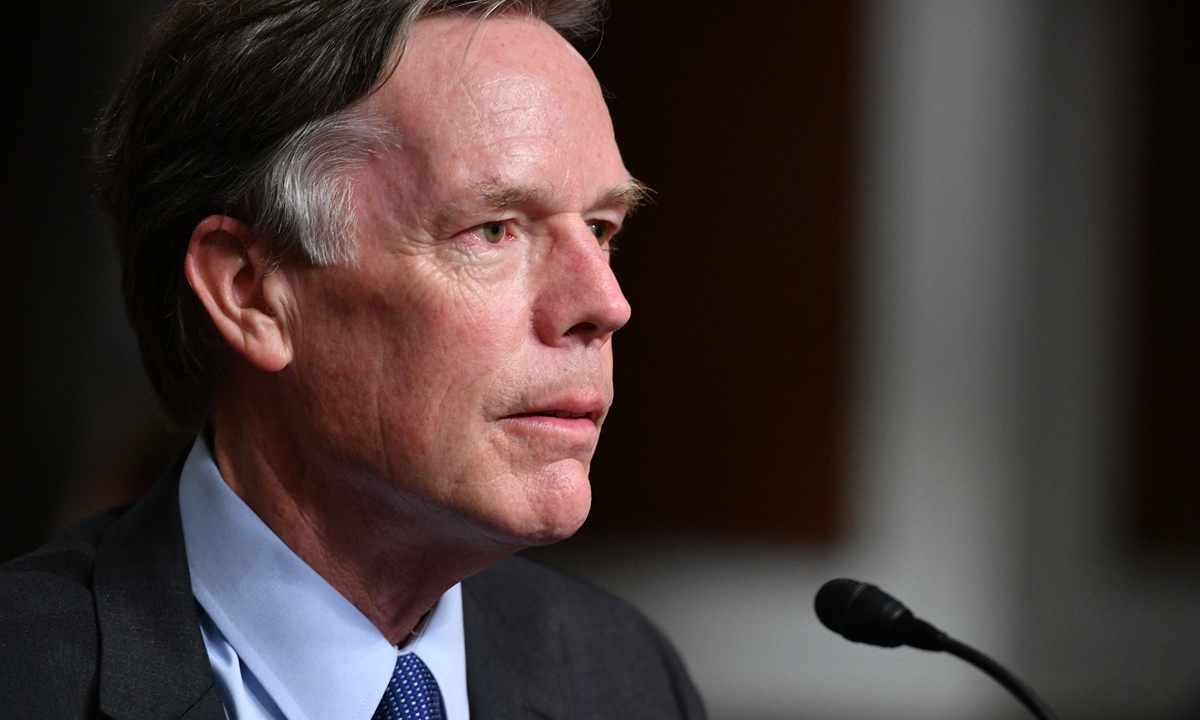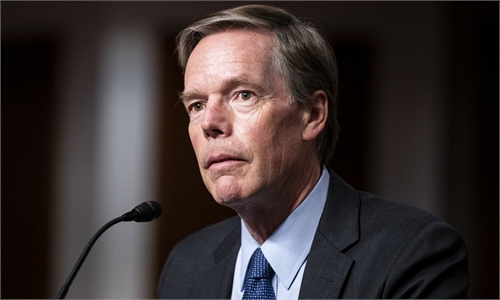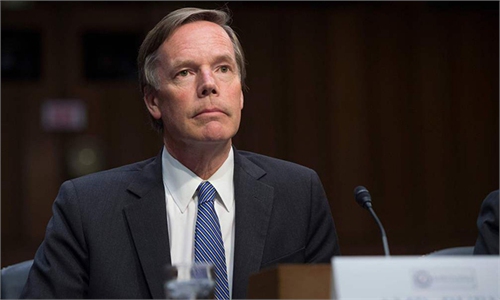
Nicholas Burns Photo: AFP
The US Senate on Thursday backed the confirmation of President Joe Biden's nomination of Nicholas Burns as ambassador to China, ending the abnormal 14-month vacancy. On the same day, Washington took three actions to suppress China: The US Treasury Department identified eight Chinese technology firms as part of the "Chinese Military-Industrial Complex" for unwarranted reasons; the US Commerce Department placed export restrictions on 34 entities including the Academy of Military Medical Sciences, and the Senate passed a so-called bill concerning China’s Xinjiang and sent the bill to the White House to be signed into law.Those "coincidences" are more like three shots that Washington fired and specially arranged to see Burns off. It's nothing more than to show that Burns' mission is not to improve US-China relations, but to put pressure on China. Analysts believe Washington is creating obstacles to bilateral relations. It has no intention of asking Burns to be a persona grata.
The US has played such tricks over and over again and we are not surprised to see this. When Burns attended a Senate hearing in October this year, he uttered remarks attacking and slandering China, such as labeling China's policies in Xinjiang as "genocide," smearing China's Hong Kong policy, and declaring that the US "cannot trust China" on the Taiwan question. He supported an increase in weapon sales to Taiwan and to make Taiwan a "tough nut to crack." These remarks were beneath his dignity as a diplomat. It's uncertain whether they represented Burns' real attitude toward China. Some people think he said so to cater to domestic audiences. One can only become ambassador to China by showing toughness against China. This shows how strong US political elites' hostility toward China is.
The position of US ambassador to China has been vacant for over a year. It shows that all anti-China agendas have been advancing extremely fast while any agenda related to dialogue and cooperation with China has progressed slowly. As the political atmosphere in Washington has been continuously poisoned, the US embassy in China has acted more and more like the Pentagon or CIA. It's shameful for a diplomatic agency to give people such an illusion.
In this context, no one can expect a new US ambassador to China to reverse the situation. If Burns chooses to "lie flat" and become a decoration that delivers Washington's messages like a machine, then he will be no different to one who idly waits for his retirement. If Burns opts to "add insult to injury" as what he did at the hearing to continue to cater to the domestic radical sentiments against China, he may get some praises from the US in the short term, but he will never win a good evaluation in history.
However, the US ambassador to China is a key position affecting China-US relations. Burns still has some room to do something.
Burns, who is 65, is a scholarly-type diplomat with rich experience. Judging from his resume, he used to serve as US ambassador to NATO and undersecretary of state for political affairs. But China-US relations are not his field of expertise. He has a background on Soviet Union issues and Democratic Party ideology, and it cannot be ruled out this will affect his views of China. But as US ambassador to China, regardless of his own characteristics, the most important point in evaluating his performance is to what extent he will promote the good development of China-US relations. If China-US relations do not improve, or become even worse during his tenure, who can expect history to give Burns a thumbs up when looking back?
As the US ambassador to China, Burns must serve US national interests. But what such interests really are requires an in-depth study by Burns, who was once a scholar. During the virtual summit meeting between Chinese and US leaders, Biden echoed Chinese President Xi Jinping that both sides should make the relationship work and not mess it up.
From this point of view, no matter what Burns said previously, we still hope he can create conditions for easing China-US relations, launch more dialogues and cooperation, and authentically send what he has learned in China and Chinese people's true feelings back to Washington. We hope he could promote Washington's rational China policies and be responsible to US national interests.
We hope that Burns, who is regarded as "professional and rational" in the US, can promote the improvement of China-US relations, become an ambassador welcomed by Chinese people, and spend a successful time in China.



